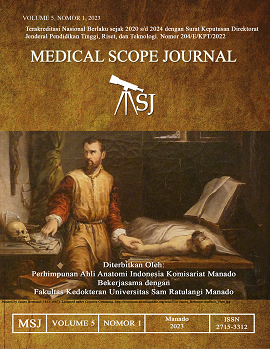Defisiensi Vitamin D dan Benign Paroxysmal Positional Vertigo Rekuren
DOI:
https://doi.org/10.35790/msj.v5i1.45279Abstract
Abstract: Benign paroxysmal positional vertigo (BPPV) is the most common peripheral vestibular disturbance. Recurrency of BPPV is highly reported in females and elderly group. This study aimed to evaluate the association between vitamin D deficiency and recurrent BPPV events. This was a literature review study using PubMed, ClinicalKey, and GoogleScholar databases. The results obtained 13 literatures according to the predetermined inclusion and exclusion criteria. Vitamin D deficiency caused disturbances in calcium metabolism and degradation of otoconia. Release of otoconia debris into the endolymph fluid could trigger the BPPV attack. Based on demography, recurrent BPPV was most frequent among female elderlies with osteoporosis/osteopenia. The level of 25(OH)D of recurrent BPPV group was lower than the non-recurrent BPPV group, and supplementation of vitamin D could reduce the recurrency of BPPV. In conclusion, vitamin D deficiency is one of the causes of recurrent BPPV since it affects the metabolism of calcium which is the constituent component of otoconia. Instability of otoconia will affect the release of otoconia debris into the endolymph fluid triggering the BPPV attacks and increasing the risk of recurrent BPPV. Vitamin D supplementation can reduce the BPPV recurrence level.
Keywords: recurrent benign paroxysmal positional vertigo; vitamin D deficiency; calcium metabolism; female; elderly
Abstrak: Benign paroxysmal positional vertigo (BPPV) merupakan penyakit gangguan keseimbangan perifer yang paling sering ditemui. Rekurensi BPPV dilaporkan lebih tinggi pada kelompok wanita dan usia lanjut. Penelitian ini bertujuan untuk mengetahui hubungan antara defisiensi vitamin D dan kejadian BPPV rekuren. Jenis penelitian ialah literature review menggunakan database PubMed, ClinicalKey, dan Google Scholar. Hasil penelitian mendapatkan 13 literatur yang ditelaah berdasarkan kriteria inklusi dan eksklusi yang ditetapkan. Pada defisiensi vitamin D terjadi gangguan metabolisme kalsium dan degradasi otokonia. Debris otokonia yang terlepas ke dalam cairan endolimf dapat memicu terjadinya serangan BPPV. Secara demografi, BPPV rekuren lebih sering dijumpai pada perempuan usia lanjut dan memiliki riwayat osteoporosis/ osteopenia. Kadar 25(OH)D pada kelompok BPPV rekuren lebih rendah dibandingkan dengan kadar 25(OH)D pada kelompok non-BPPV rekuren, dan pemberian suplementasi vitamin D dapat menurunkan tingkat rekurensi pasien BPPV. Simpulan penelitian ini ialah defisiensi vitamin D merupakan salah satu penyebab dari perjalanan penyakit BPPV menjadi rekuren. Defisiensi vitamin ini memengaruhi metabolisme kalsium yang merupakan komponen penyusun otokonia. Instabilitas otokonia akan memengaruhi pelepasan debris ke cairan endolimf sehingga mencetuskan serangan BPPV dan meningkatkan risiko terjadinya BPPV rekuren. Pemberian suplementasi vitamin D dapat menurunkan tingkat rekurensi BPPV.
Kata kunci: benign paroxysmal positional vertigo rekuren, defisiensi vitamin D; metabolism kalsium; jenis kelamin perempuan; usia lanjut
References
Warouw DF, Tumboimbela MJ. Characteristics of patients with balance disorders at Neurootology and Neuroophtalmology Clinic in Prof. Dr. Rd Kandou Hospital Manado. J Sinaps. 2020;3(2):58–65
Sherwood L. Fisiologi Manusia: Dari Sel Ke Sistem (9th ed). Jakarta: EGC; 2018.
Luryi AL, Lawrence J, Bojrab DI, LaRouere M, Babu S, Zappia J, et al.Recurrence in benign paroxysmal positional vertigo: a large, single-institution study. Otol Neurotol. 2018;39(5):622–7.
Bisdorff AR, Staab JP, Newman-toker DE. Overview of the international classification of vestibular disorders. Neurologic Cllinic. 2015;33(3):541–50.
Mohsin FD, Alharbawi AF, Alraho TS. Benign paroxysmal positional vertigo and vitamin D deficiency. Pharma Innovation. 2019;8(3):49-52.
Jain S, Singh SP, Singh HN, Dubey AK, Upadhyay VP. To evaluate the effect of serum vitamin D3 on the treatment of BPPV. Up State J Otolaryngol Head Neck Surg. 2020;8(1):21–9.
Abdelmaksoud AA, Fahim DFM, Bazeed SES, Alemam MF, Aref ZF. Relation between vitamin D deficiency and benign paroxysmal positional vertigo. Sci Rep. 2021;11(1):1–7.
Rhim GI. Serum vitamin D and long-term outcomes of benign paroxysmal positional vertigo. Clin Exp Otorhinolaryngol. 2019;12(3):273–8.
Melis A, Rizzo D, Gallus R, Leo ME, Turra N, Masnaghetti D, et al. Relationship between calcium metabolism and benign paroxysmal positional vertigo in north Sardinia population. J Vestib Res Equilib Orientat. 2020;30(6):375–82.
de Sousa CPJM, Pereira ADM, de Magalhães CMP, Duarte DR da S, da Silva Cunha TNM. Vitamin D deficiency and benign paroxysmal positioning vertigo. Hear Balanc Commun. 2019;17(2):179–81.
Mohsin FD, Alharbawi AF, Alraho TS. Benign paroxysmal positional vertigo and vitamin D deficiency. Pharma Innovation. 2019;8(3):49-52.
Rhim GI. Effect of citamin D injection in recurrent benign paroxysmal positional vertigo with vitamin D deficiency. Int Arch Otorhinolaryngol. 2020;24(4):423–8.
Sreenivas V, Sima NH, Philip S. The role of comorbidities in benign paroxysmal positional vertigo. Ear, Nose Throat J. 2021;100(5):225–30.
Pecci R, Mandalà M, Marcari A, Bertolai R, Vannucchi P, Santimone R, et al. Vitamin D insufficiency/deficiency in patients with recurrent benign paroxysmal positional vertigo. J Int Adv Otol. 2022;18(2):158–66.
Libonati GA, Leone A, Martellucci S, Gallo A, Albera R, Lucisano S, et al. Prevention of recurrent benign paroxysmal positional vertigo: the role of combined supplementation with vitamin D and antioxidants. Audiol Res. 2022;12(4):445–56.
Jeong SH, Kim JS, Kim HJ, Choi JY, Koo JW, Choi KD, et al. Prevention of benign paroxysmal positional vertigo with vitamin D supplementation: A randomized trial. Neurology. 2020;95(9):1117–25.
Maslovara S, Butkovic Soldo S, Sestak A, Milinkovic K, Rogic-Namacinski J, Soldo A. 25 (OH) D3 levels, incidence and recurrence of different clinical forms of benig paroxysmal positional vertigo. Braz J Otorhinolaryngol. 2018;84(4):453–9.
Ding J, Liu L, Kong WK, Chen XB, Liu X. Serum levels of 25-hydroxy vitamin D correlate with idiopathic benign paroxysmal positional vertigo. Biosci Rep. 2019;39(4):BST20190142. Doi: 10.1042/BSR20190142
Büki B, Ecker M, Jünger H, Lundberg YW. Vitamin D deficiency and benign paroxysmal positioning vertigo. Med Hypotheses. 2013;80(2):201-4.
Inan HC, Mertog C. Investigation of serum calcium and 25-hydroxy vitamin D levels in benign paroxysmal positional vertigo patients. Ear Nose Throat J. 2021;100(9):643-646. Doi: 10.1177/0145561321989451
Vibert D, Kompis M, Häusler R. Benign paroxysmal positional vertigo in older women may be related to osteoporosis and osteopenia. Ann Otol Rhinol Laryngol. 2003;112(10):885–9.
Jang YS, Kang MK. Relationship between bone mineral density and clinical features in women with idiopathic benign paroxysmal positional vertigo. Otol Neurotol. 2009;30(1):95–100.
Downloads
Published
How to Cite
Issue
Section
License
Copyright (c) 2023 Deva J. Karel, Olivia C. P. Pelealu, Rizki R. Najoan

This work is licensed under a Creative Commons Attribution-NonCommercial 4.0 International License.
COPYRIGHT
Authors who publish with this journal agree to the following terms:
Authors hold their copyright and grant this journal the privilege of first publication, with the work simultaneously licensed under a Creative Commons Attribution License that permits others to impart the work with an acknowledgment of the work's origin and initial publication by this journal.
Authors can enter into separate or additional contractual arrangements for the non-exclusive distribution of the journal's published version of the work (for example, post it to an institutional repository or publish it in a book), with an acknowledgment of its underlying publication in this journal.
Authors are permitted and encouraged to post their work online (for example, in institutional repositories or on their website) as it can lead to productive exchanges, as well as earlier and greater citation of the published work (See The Effect of Open Access).










